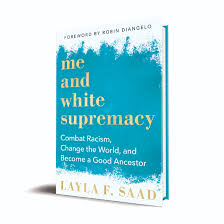 Anyone else making their way through Layla Saad’s “Me and White Supremacy”?
Anyone else making their way through Layla Saad’s “Me and White Supremacy”?
I’ve made it to day 10…even though I started in February.
I keep finding myself needing to return to previous “days”. In particular, Day 3 – You and Tone Policing.
For me, I need to continue to dig deeper into this particular aspect of white supremacy because I recognize the strong implications for the way I interact with children, families, colleagues, and friends who are black, indigenous, and/or who are people color.
If you aren’t sure what “tone policing” is, here’s how Layla defines it on pages 46 and 47 of her book.
Tone policing is a tactic used by those who have privilege to silence those who do not by focusing on the tone of what is being said rather than the actual content…BIPOC are expected to cater to the white gaze – the white supremacist lens through which people with white privilege see BIPOC – and the comfort level of a person’s white facility when taking about racism.”
I’ve read this definition many, many times. And to be honest, I feel like I’m a four-year old who can see when others are doing something wrong a whole lot easier than when I do something wrong.
Here are a couple of examples of where I can “see it” in others…yet continue to struggle to catch it, and change it, in my own thoughts and actions.
1) The move Jerry Maguire.
The other night as I was watching the movie Jerry Maguire, I was aware of many instances of tone policing (as well as tons of examples of how popular movies uphold white dominant culture).
Specifically, tone policing was demonstrated in a scene that I bet most of us who are white, only noticed and remember as one of the more famous lines where Jerry says, “Help me Rod. Help me, help you.”
What I didn’t see when I watched the movie years ago, was how many of the things Jerry Maguire said to Rod Tidwell, prioritized how he (Jerry) and the white coaches and owners felt, over Rod’s physical and emotional well-being.
Comments like: “Let’s bury the attitude a little bit.” or “It wasn’t just about the money, was it?” or “Let’s show them your pure joy of the game.”
These “suggestions” were aimed to get him (Rod) to change how he was acting, what he was thinking, and how he was feeling – ultimately the aim was to keep him in line and reinforce that Jerry as a white person, knows best.
2) The book – The Invention of Wings.
As I was reading “The Invention of Wings” by Sue Monk Kidd (which is another struggle for another day), this passage struck me as a clear example of tone policing (and much more I know).
Overhead, in the upper galleries, the slaves began their bangle and laughter. It was a perennial problem, this noise. They found boldness in the balcony the way they found it on the streets, from their numbers. Recently, their racket had escaped to such a degree that monitors had been placed in the balconies as deterrents. Despite them, the rumblings grew.”
In talking to Ijumaa Jordan about how I’m upholding white dominant culture in my work, she helped me to think about tone policing more deeply, by asking, “Who is being harmed? What is being valued or prioritized over the harm that is being caused?”.
In other words, where is the focus of the conversation? Why are we saying, “It would be better if…”? Whose comfort are we protecting?
Like in movies and books, when we examine current events like protests and riots, we see tone policing when those of us who are white, focus on the destruction of property. When we focus on how destroying property is “bad” or “problematic” instead of focusing, and being concerned with, the loss of lives that have resulted from systemic racism and oppression.
As Ijumaa says, buildings can be replaced, human lives cannot.
If I as a white person, continue to focus on the way in which BIPOC push against injustice (e.g., I think/say, “They shouldn’t do it in ways that break the law, or They shouldn’t be so angry, or They should use tactics that are more peaceful,” etc.), then I’ve missed the point.
I’ve missed the fact that legal, judicial, and educational systems (to name just a few) are flawed and unjust toward BIPOC.
I’ve missed the opportunity to help dismantle oppression because I was more concerned with my comfort.